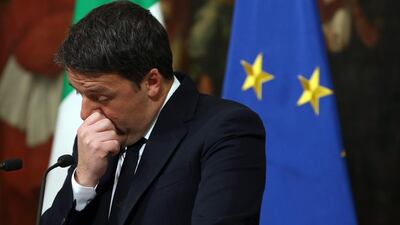DUBLIN // Italy faces up to a year of political uncertainty after prime minister Matteo Renzi’s resignation paved the way for a caretaker government to tide the country through to parliamentary elections in February 2018.
Mr Renzi, 41, announced his resignation late on Sunday as it became clear voters had rejected constitutional reforms he was seeking. “My experience of government ends here,” he declared, keeping his promise to step down if he lost the referendum.
Mr Renzi had said the constitutional changes would make Italy easier to govern by paring away powers of regional governments, strengthening the federal government and shrinking the size and power of parliament’s upper house to ease the gridlock that frequently plagues Italian legislation.
“We tried, we gave Italians a chance to change but we didn’t make it,” Mr Renzi said. “We wanted to win, not to take part in the competition.”
Nearly 68 per cent of Italian voters took part in the referendum on Sunday. Although opinion polls had predicted a defeat they did not anticipate the scale of the opposition to Mr Renzi’s proposals, with 60 per cent voting No.
Anger at Mr Renzi’s seemingly arrogant style of functioning and failure to reboot the flagging economy since taking office in 2014 is believed to have played a part in the result.
Ahead of the vote, analysts voiced fears that a victory for the No camp and Mr Renzi’s resignation could plunge Italy into political and economic turmoil. The prospect drew comparisons with the Brexit referendum in June and the election of Donald Trump to the US presidency.
Although markets recovered swiftly on Monday from a post-referendum dip and the euro recouped initial losses against the dollar, the outlook for troubled Italian banks was severely affected by the exit of Mr Renzi.
Banking stocks opened sharply lower, and then recovered before plunging again. Concern focused on Italy’s third-biggest bank, Monte dei Paschi di Siena (BMPS) which has lost 84 per cent of its market capitalisation this year.
Mr Renzi’s resignation halts his reform agenda, with his key measure to date the so-called Jobs Act to make it easier for businesses to hire and fire. For the near future, he had pledged tax cuts, more state investment, and steps to tackle corruption and make the state sector more efficient. But the referendum campaign had put much of his agenda on hold.
Wolfgang Schauble, Germany’s finance minister, praised Mr Renzi’s record of reforms but said the referendum result was no cause for alarm.
“I think we should see the situation in Italy with a certain calmness,” Mr Schauble said. “That is how democratic and constitutional processes work in the member states. The Italians have decided, that is to be respected. They will make the best of it.”
Frank-Walter Steinmeier, Germany’s foreign minister, acknowledged that the turn of events was “not a positive message to Europe at a difficult time”.
But Marine Le Pen, leader of France’s right-wing Front National party, argued that the vote represented support for Italian opposition parties who want their country to leave the European Union.
“We must listen to this thirst for freedom of nations,” Ms Le Pen, who is running to be France’s next president herself, said on Twitter.
It will now fall to Sergio Mattarella, the Italian president, to put together a caretaker government in consultation with all parties. But a number of right-wing Italian parties are calling for elections to be brought forward, to capitalise upon what they see as a wave of anti-establishment fervour.
Beppe Grillo, a former comedian who leads the Five Star Movement (MS5), a nationalist party that seeks to extricate Italy from the EU, called for elections to be held “within a week”.
He was joined in this call by the Northern League, another party of the right. “Long live Trump, long live [Russian president Vladimir] Putin, long live Le Pen and long live the [Northern] League,” Matteo Salvini, head of the party, said on Twitter.
Much will now hinge on electoral mechanisms that determine how the houses of parliament are constituted, said Alberto Mingardi, the head of Istituto Bruno Leoni, a Milan-based think tank.
The referendum had proposed that the senate — parliament’s upper house — consist of members nominated by regional assemblies rather than elected by the public. With the referendum’s defeat, the senate will retain its system of being constituted according to proportional representation, with its seats divided according to the parties’ shares of votes cast in a separate senate election.
Under Mr Renzi, elections to the lower house, known as the chamber of deputies, were reformed last year. In the new method, all parties compete in a first electoral round, and the two most successful parties compete afresh in a second-round run-off. The MS5 has done well this year in local elections that have used this method, with its candidates being elected mayors of Rome and Turin.
Most parties, Mr Mingardi said, are fearful that MS5 will perform well in run-offs in parliamentary elections as well, and will subsequently form the government.
This is why mainstream parties are likely to push for “the purely proportional system extended to both houses,” he told The National.
“I think this would be a disaster,” he added. “As the likelihood of any party winning a clear majority of the votes is small, this would make Italy a country run by a permanent grand coalition between the right and the left, with the sole purpose of keeping the MS5 at bay.”
ssubramanian@thenational.ae
* With additional reporting from Agence France-Presse

